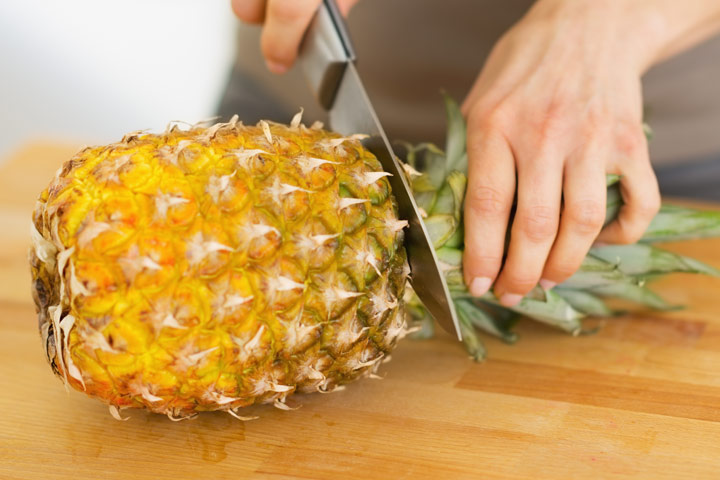
During pregnancy, women avoid eating certain foods such as pineapple and papaya as they fear that the heat generated by these fruits could lead to a miscarriage. But are such fears backed by any scientific research? MomJunction helps you understand how safe it is to have pineapple during pregnancy.
Is Pineapple Safe To Eat During Pregnancy?
Yes, it is safe to include pineapple in your diet (1). Eating one to two cups a week is safe and yields positive health effects for you and your baby. Overeating, like having seven to ten cups a week, may cause problems. It may increase bromelain amount in the body that could put you at risk of miscarriage. Instead, you can have canned pineapples or pineapple juice as bromelain is removed in the canning process (2).
Benefits Of Pineapple For Pregnant Women:
Pineapple contains abundant amounts of vitamins and minerals, which keep you healthy during pregnancy. They have low saturated fats and high dietary fiber, thus having high nutritional value.
1. Vitamin C:
a. Boosts Immunity: Pineapples contain high amounts of vitamin C, the water soluble antioxidants which fight against the cell impairment that takes place inside your body, and help boost immunity during pregnancy.
b. Produces Collagen: One cup of pineapple offers nearly 79 milligrams of vitamin C, which promotes collagen production. Collagen is responsible for the growth of your baby’s skin, cartilage, bones, and tendons. One single cup nearly offers the daily requirement, i.e., 80 – 85 milligrams of vitamin C during pregnancy (3).
2. Manganese:
The mineral manganese is an essential enzyme for promoting bone development, strong and healthy bones and prevention of osteoporosis.
3. Vitamin B1:
Vitamin B1 or thiamine is useful for proper muscle functioning and healthy nervous system and heart.
4. Vitamin B6:
Vitamin B6 or pyridoxine is responsible for preparing antibodies and producing energy. It also offers a great relief from morning sickness. Deficiency of vitamin B6 leads to anemia, and pineapple helps red blood cell formation as it contains good amounts of this vitamin.
5. Copper:
Pineapple also contains trace amounts of copper, which helps in the production of red blood cells and formation of baby’s heart.
6. Dietary Fiber:
A high source of fiber, it effectively eases constipation, which is a common complaint in the early stages of pregnancy.
7. Iron And Folic Acid:
A fresh pineapple can offer sufficient amounts of iron, essential for red blood cell production and folic acid, helpful in preventing some birth defects (4).
8. Bromelain:
The bromelain in pineapples helps combat the bacteria that resides in the gut and repairs the gastro-intestinal tract.
9. Diuretic Property:
Pineapple’s diuretic effect helps in removing excess liquids from the body. This prevents swelling, which is a common symptom during pregnancy.
10. Treats Varicose Veins:
Most pregnant women develop varicose veins during pregnancy. Varicose veins in legs widen, bulge, and twist, causing pain. Bromelain in pineapple lessens the formation of fibrous deposits on varicose veins and reduces discomfort.
11. Enhances Mood:
The unique aroma and taste of the fruit improves mood and restores emotional strength. It is a healthy and delicious fruit that helps you to get rid of anxiety, depression, and obsessive thoughts.
12. Lowers Blood Pressure:
You are likely to have high blood pressure during pregnancy. Bromelain in pineapple helps in thinning the blood and thus lowering blood pressure. It also prevents the formation of blood clots.
Risks Of Eating Pineapple While You Are Pregnant:
1. Heartburn Or Reflux:
If you have a sensitive stomach and a weak digestive system, avoid pineapple. The acids present in the fruit could lead to heartburn or reflux.
2. Miscarriage:
According to Maternal-Child Health – Interdisciplinary Aspects Within the Perspective of Global Health book, excess pineapple will increase bromelain content in the body, which affects the cervix, causing miscarriage or premature labor. It also causes vomiting, skin rash, and uterine contractions in your first trimester.
3. High Sugars:
If you are suffering from gestational diabetes, then pineapple may not be the correct food as its high sugar levels will aggravate your condition.
4. Overweight:
If you are overweight, you should avoid consuming pineapple due to its high-calorie content.
5. Diarrhea:
Too much of pineapple can increase bromelain, leading to diarrhea.
6. Tenderness:
Excessive consumption of pineapple can cause tenderness or swelling on the tongue, inner cheeks and lips. These do fade away in a while.
It is best to avoid pineapple if you are suffering from peptic ulcer disease, gastritis, risk of miscarriage, bad coagulability of blood, and low blood pressure.
If you are eating pineapple for the first time during pregnancy, you may experience certain allergic symptoms. Check with your doctor if you happen to get:
These reactions are similar to the allergic reactions of latex or pollen and occur within minutes of pineapple consumption.
Myths About Pineapple During Pregnancy:
Just like saffron, pineapple has been labeled as a ‘hot food’ and unsafe during pregnancy. Some people have a wrong notion that it induces natural labor. However, there is no scientific evidence to support this claim. It should be consumed in excessive quantities to induce labor.
How Much Pineapple Can A Pregnant Woman Have?
How To Choose A Pineapple?
Pineapple offers maximum benefits if they are fresh and ripe. These simple ways will help you in selecting the best fruit for consumption.
How To Include Pineapple In Your Pregnancy Diet?
A Few Recipes:
1. Pineapple Popsicles
You will need
How to
2. Pineapple Mango Smoothie:
You will need
How To
Do check with your doctor to get the best advice on pineapple consumption during pregnancy.
Did you have pineapple during pregnancy and burst the myths? Let us know.

No comments:
Post a Comment